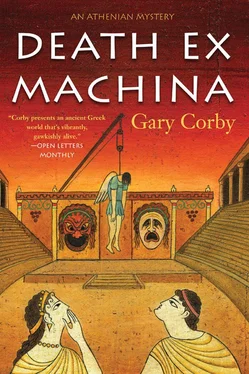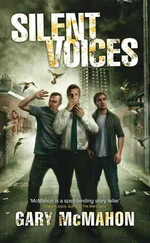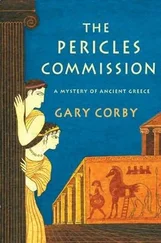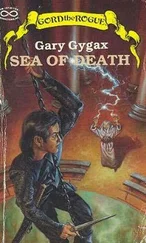Gary Corby - Death Ex Machina
Здесь есть возможность читать онлайн «Gary Corby - Death Ex Machina» весь текст электронной книги совершенно бесплатно (целиком полную версию без сокращений). В некоторых случаях можно слушать аудио, скачать через торрент в формате fb2 и присутствует краткое содержание. Год выпуска: 2015, ISBN: 2015, Издательство: Soho Press, Жанр: Исторический детектив, на английском языке. Описание произведения, (предисловие) а так же отзывы посетителей доступны на портале библиотеки ЛибКат.
- Название:Death Ex Machina
- Автор:
- Издательство:Soho Press
- Жанр:
- Год:2015
- ISBN:978-1-61695-520-5
- Рейтинг книги:3 / 5. Голосов: 1
-
Избранное:Добавить в избранное
- Отзывы:
-
Ваша оценка:
- 60
- 1
- 2
- 3
- 4
- 5
Death Ex Machina: краткое содержание, описание и аннотация
Предлагаем к чтению аннотацию, описание, краткое содержание или предисловие (зависит от того, что написал сам автор книги «Death Ex Machina»). Если вы не нашли необходимую информацию о книге — напишите в комментариях, мы постараемся отыскать её.
Death Ex Machina — читать онлайн бесплатно полную книгу (весь текст) целиком
Ниже представлен текст книги, разбитый по страницам. Система сохранения места последней прочитанной страницы, позволяет с удобством читать онлайн бесплатно книгу «Death Ex Machina», без необходимости каждый раз заново искать на чём Вы остановились. Поставьте закладку, и сможете в любой момент перейти на страницу, на которой закончили чтение.
Интервал:
Закладка:
Pericles had called a council of war, and the highest citizens had obeyed. It spoke volumes about the influence that Pericles wielded in the city that he thought nothing of summoning fellow citizens, that even the archons who were senior to Pericles in rank came at his call. It was nothing to do with his official position, which was an elected strategos , a General of the Army. Strategos was a position of great power, but there were nine other men with exactly the same title and no one treated the other nine with such deference. The power of Pericles lay in his voice, which was an instrument of the Gods, and in the charisma he exuded as easily as he breathed. I often forgot how easily others fell under his spell. I seemed to be the only man in Athens who wasn’t impressed.
There were more than twenty men in the courtyard and not enough places to sit. Though he was a wealthy man, Pericles hated spending money on anything, even on his own comfort. Especially on his own comfort. Pericles liked the best of everything, but not much of it. His courtyard was barely larger than that of a normal man. As the least important man present I stood. So did the lead actors and several of the others. Pericles ensured that Aeschylus sat in a seat of honor, and beside him the archons. These were the three executives responsible for the running of the city: the Eponymous Archon, the Basileus, and the Polemarch. I’d had cause to deal with all three offices in the past, but there’d been a recent election and these men were all new to their jobs. The final man arrived at that moment: the High Priest of Dionysos, the man with whom Diotima had first expelled the ghost. He looked slightly out of breath.
Pericles brought the archons up to date with what had happened. The three nodded grimly.
Throughout this Pericles couldn’t hide his irritation with the situation.
These powerful visitors stared at Pericles with some astonishment. Pericles had a reputation for being the calmest, most dignified, and certainly the most decorous man in Athens. They had never before seen him so upset. I, on the other hand, was used to it. I usually saw Pericles in his private office, when a crisis was at hand and events had turned against us. At those times he could be the most demanding man in the world. He had no tolerance for anyone whose service to the city was less than perfect.
Pericles continued the meeting with a question.
“Who is the victim?” he asked.
“Romanos of Phrygia,” Sophocles said. “I’m the author of this tragedy. May the Gods forgive me. Romanos was deuteragonist of my play.”
“The dead man’s not a citizen then?”
“No, he’s a metic.”
“What do we know about him?”
“Very little,” I said. “The only man who knew him at all was Lakon.”
Lakon gestured in an elegant movement that reminded me of someone, but I couldn’t say whom.
“Hardly that,” Lakon said. “I knew Romanos. Of course I did. But there isn’t much I can tell you. One doesn’t like to move in such circles.” Lakon pronounced every word perfectly and yet oddly rounded. His voice was rich and flowed like honey, as full of pleasant timbre and as precisely controlled as Pericles’s own. I thought it quite remarkable.
“What circles?” someone at the back of the courtyard asked.
“Metics,” Lakon said. He gave the word just enough stress to show what he thought of metics. “Romanos was merely a professional colleague. Even then, I’m not quite sure what he was doing in a Dionysia play.” Lakon cast a sidelong glance at Sophocles, as if to say the playwright had been slumming when he invited Romanos onto the cast.
Sophocles turned a dangerous red.
“I don’t think I know you?” Pericles said to Lakon. I knew what Pericles was thinking. I could imagine the effect if that voice spoke before the People’s Assembly. If Pericles had a competitor for best orator in Athens, he wanted to know about it before they faced each other in debate.
“You don’t recognize me, yet you have seen me many times,” Lakon replied with a superior air. “I am the protagonist, the lead actor of this play.”
“Oh, I see. Nice to meet you,” said Pericles dismissively, and with an audible trace of relief. He had once said to me that no one in their right mind would ever vote for an actor. That Lakon had trod the stage automatically meant he had no future in politics.
Pericles said to the assembly at large, “Is there anyone in Athens to avenge the murdered man?”
“His family,” I said. “He has a sister and brother-in-law here. But they of course are also metics.”
Several grunts of dismissal sounded around the room. Everyone knew a metic had little chance of avenging a murder in Athens.
Pericles said, “Are there any other questions?”
The Eponymous Archon had only one. He said, “How quickly can you get the play restarted?”
Everyone present stared at the Eponymous Archon in astonishment.
“We can’t,” Sophocles said.
“What? Don’t you have a replacement actor? Surely you do.”
Sophocles said, “The problem is it would be impious to continue.”
“Even so I must insist the festival carries on,” said the Eponymous Archon. He sounded angry. “It’s a question of national pride.”
“Didn’t you hear what Sophocles said?” asked the Basileus. He was the archon in charge of religious affairs. “Did you not hear that the God’s statue was placed on the stage, facing the crime? Gentlemen, this is a murder committed in the presence of the God. On his most sacred ground-the theater-right before his most sacred festival, the Great Dionysia.”
Everyone glumly contemplated his words.
“The god Dionysos must be furious at what’s happened. Can you imagine the bad luck that would descend on the city if we continued as if nothing had happened? I’m sure the High Priest of Dionysos agrees with me.”
All eyes turned to the High Priest Theokritos. He nodded unhappily. “It’s true.”
“What would it take to appease the God?” the Eponymous Archon asked.
“Perhaps a major sacrifice?” the High Priest suggested. “Like the Eponymous Archon, I too am most reluctant to abandon the Dionysia, or even delay it for an instant.”
“Your reluctance is understandable, my friend,” said the Basileus. “But we all know impiety is a major crime, the biggest there is.”
Theokritos sighed. “Yes. I know what you’re about to say.”
“The Great Dionysia must be suspended,” said the Basileus.
In the shocked silence that followed, the Eponymous Archon asked, “What would it take, then, to restart the festival?”
“Punishment of the killer, of course,” the Basileus said.
“What’s the penalty for impiety?” someone asked.
“Death by stoning,” Theokritos said. That meant the murderer would be taken to a nearby quarry, where he would be tied to a stake, and the people of Athens would take turns throwing rocks at him until he was dead.
“All right then,” said the Eponymous Archon. “Let’s execute the murderer and get on with the festival.”
“There’s only one little detail,” Aeschylus pointed out. “We don’t know who did it.”
My stomach lurched.
“Whose job is that?” the Eponymous Archon asked.
“Er, that would be me. Sir,” I said.
The most powerful city official in Athens turned to stare at me. “I didn’t catch your name. You are?”
“Nicolaos, son of Sophroniscus,” I said.
“I’ve heard of you,” the Eponymous Archon said. He didn’t say if what he’d heard was good or bad. Instead he went on, “This is a disaster on so many levels, I barely know where to begin.”
I hoped he didn’t mean me.
Читать дальшеИнтервал:
Закладка:
Похожие книги на «Death Ex Machina»
Представляем Вашему вниманию похожие книги на «Death Ex Machina» списком для выбора. Мы отобрали схожую по названию и смыслу литературу в надежде предоставить читателям больше вариантов отыскать новые, интересные, ещё непрочитанные произведения.
Обсуждение, отзывы о книге «Death Ex Machina» и просто собственные мнения читателей. Оставьте ваши комментарии, напишите, что Вы думаете о произведении, его смысле или главных героях. Укажите что конкретно понравилось, а что нет, и почему Вы так считаете.












